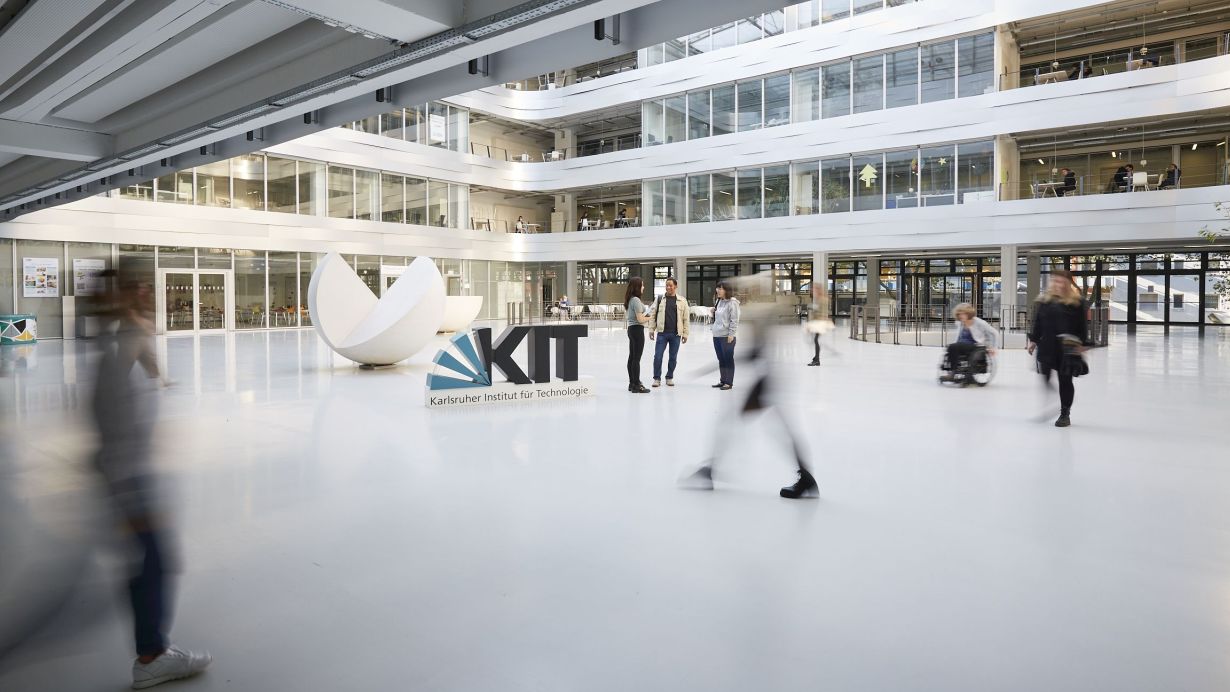With one new full proposal, Karlsruhe Institute of Technology (KIT) will go into the final of the “Clusters of Excellence” funding line of the Excellence Strategy Competition launched by the federal and state governments. KIT’s sketch of a chemical platform for highly precise quantum architectures convinced the international expert jury. The results of the first selection round were announced by the German Research Foundation (DFG) and the Council of Science and Humanities (WR) this morning (February 2, 2024). In addition, KIT and its partners will submit renewal proposals for the two existing Clusters of Excellence on 3D designer materials and battery research.
“The Excellence Strategy competition is highly demanding, with strong competitors from the very beginning. We feel deeply disappointed by the fact that we are allowed to submit only one full proposal apart from the proposals for the renewal of our existing clusters of excellence. We have not met our expectations,” says Professor Oliver Kraft, Acting President of KIT. “However, we still have chances in the next selection round. Together with our partners in Stuttgart and Ulm and in Heidelberg, Ulm, and Gießen, we are determined and motivated to work on the new full proposal and the two renewal proposals, respectively.”
Altogether, 143 initiatives from all over Germany submitted sketches for clusters of excellence. Of these, 41 are now invited to submit full proposals by the experts. KIT submitted eight sketches in the first round.
KIT will now enter the final round with this new full proposal:
Chem4Quant: Chemical Design of Highly Precise Quantum Architectures
Researchers of KIT, Ulm University, and the University of Stuttgart have conceived their joint initiative “Chem4Quant” to specifically design materials for future quantum technologies. In spite of the breakthroughs already achieved in quantum technologies, many existing platforms are still limited in terms of scalability, switchability, connectivity, and error correction. Chem4Quant therefore proposes to establish a fundamentally different approach: Chemically designed quantum architectures that allow to specifically plan molecular structures of atomic precision and to control their quantum properties. Such qubits can be positioned in electrical or photonic components with unprecedented resolution. The initiative aims to develop novel quantum devices and implement first components for the future quantum internet. Chem4Quant relies on the worldwide unique expertise of the consortium in the area of molecular quantum systems and well-established collaborations.
Renewal Proposals for the Clusters of Excellence on 3D Designer Materials and Battery Research
In addition, KIT will submit renewal proposals for its two clusters of excellence funded since late 2019: Within the Cluster of Excellence “3D Matter Made to Order” (3DMM2O), researchers of KIT and the University of Heidelberg develop innovative technologies for three-dimensional additive manufacture from the molecular to the macroscopic scale. Work is aimed at significantly improving materials and technologies in terms of resolution, speed, and multi-material printing and at using them in engineering and life sciences. Future batteries are in the focus of the Cluster of Excellence “Post Lithium Storage” (POLiS) of KIT, Ulm University, and the University of Gießen. Researchers work on new materials and technologies to make future energy storage systems more efficient, reliable, sustainable, and environmentally compatible than current lithium-ion batteries. The associated partner is the Center for Solar Energy and Hydrogen Research Baden-Württemberg (ZSW).
Cluster of Excellence Initiatives – Information on Selection
In late summer and fall 2023, the sketches submitted were reviewed by international panels using scientific quality criteria. On February 1, 2024, the experts then decided on the admission of full proposals for the final selection round.
These full proposals will have to be submitted by August 22, 2024. The same deadline holds for the submission of renewal proposals for existing clusters of excellence. In May 2025, the Excellence Commission consisting of members of the Expert Panels and the Science Ministers of the Federation and the States will make its final decision on which clusters of excellence will be funded in the future. Funding will start on January 1, 2026. The funding period will be seven years. The annual funding available for this funding line totals about EUR 539 million.
Excellence Strategy of the Federal and State Governments
The aim of the Excellence Strategy is to strengthen Germany’s position as an outstanding research hub in the long term and to further improve its international competitiveness. The Clusters of Excellence funding line is designed to support project-based funding in internationally competitive fields of research at universities or university consortia. It is one of the biggest programs funding research in Germany. Each cluster of excellence may be funded with a total of up to EUR 70 million over a duration of seven years.
The Universities of Excellence funding line serves to strengthen universities in the long term and to further develop their leading international role in research. The funding decision for the Universities of Excellence funding line will be made in 2026. To submit proposals in this funding line, funding of at least two Clusters of Excellence will be required.
Further Information:
www.dfg.de/exzellenzstrategie
www.wissenschaftsrat.de/exzellenzstrategie
Being “The Research University in the Helmholtz Association”, KIT creates and imparts knowledge for the society and the environment. It is the objective to make significant contributions to the global challenges in the fields of energy, mobility, and information. For this, about 10,000 employees cooperate in a broad range of disciplines in natural sciences, engineering sciences, economics, and the humanities and social sciences. KIT prepares its 22,800 students for responsible tasks in society, industry, and science by offering research-based study programs. Innovation efforts at KIT build a bridge between important scientific findings and their application for the benefit of society, economic prosperity, and the preservation of our natural basis of life. KIT is one of the German universities of excellence.

